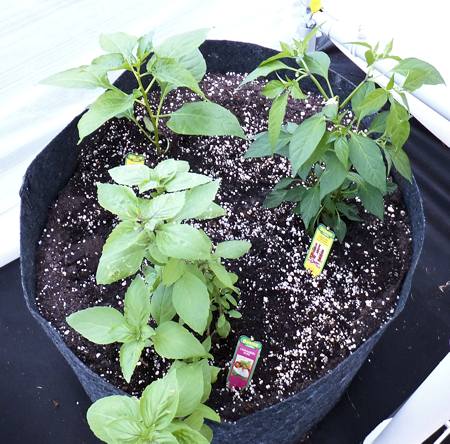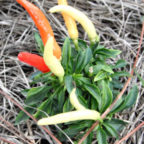What Kind of Soil Do Peppers Like?
So what kind of soil do peppers like? Glad you asked, because the soil you use for planting your peppers has a lot to do with how they grow.
Soil Types
There are three main soil types. Different locations have different soils, so if you plan to plant your garden in the ground, you need to know what you have.
- Sandy
- Clay
- Loam
If you want to know more about these soil types, here’s a post all about them. But on to what the peppers like.
Peppers Like What Soil?
As you might guess, peppers like a balanced soil — not quite sandy, not quite clay. But let’s think about that a little more.
Wild peppers originated in Central and South America, and the soils there are definitely more sandy than clay or loam — so it’s loose and well-draining. But there are also peppers which grew in soils that were a bit richer, if they grew in a more jungle-ish area. Still, the soil tended to be well-draining.
That is where peppers started; what about growing them in your garden?
How Does Your Garden Grow?
Wild peppers were in more sandy soil, but now our pepper plants are domesticated, and their needs have some changes.
Peppers still like well-draining soil, but not necessarily sandy. They do like their nutrients, though, so not too well-draining — they just don’t like to constantly have wet feet. Loose soil lets the new, small roots penetrate easily, in their search for nutrients and moisture. The looseness also lets the roots breath a bit.
They also like their nutrients! We’re growing peppers for production, or to be ornamental (which is production, if you think about it). They need nutrients in the form of fertilizer, whether it is organic, non-organic or a mix of both, to support their bounty. Just remember not to over-fertilize. (Here’s more information about organic fertilizers and fertilizing pepper plants.)
I’ve been mostly talking garden soil, but the same also applies to peppers grown in containers. One extra thing to remember about containers is that they need drainage. Make sure your planter has a hole for the water to drain out, or use a grow bag which lets the water drain without holes.
Organic Fertilizer and Growing Peppers
My preference is for organic fertilizer, especially when it comes to growing anything (like peppers) that I plan to eat.  And while I realize that not everyone is comfortable with using organic, I really do think it’s best.
Organic Fertilizer and Worms
Now my absolute favorite is worm castings, but in the past it’s been difficult to find in small enough quantities for a reasonable price. However, here are some earthworm castings in the smaller quantities — I usually get it in the 15 lb size.
I like earthworm castings because they have always seemed to me (in my growing) that the plants just like the nutrients the castings give to the soil. No burning, totally organic, but nevertheless, quite concentrated; a fairly little amount can fertilize a lot of plants. Instead of mixing it in with my potting mix or garden soil, I just put a handful in each hole before I plant my seedlings or starters.
But I’ve found something else pretty recently that I like; it’s called Terracycle organic fertilizer.
You may be asking…TerraCycle? What the heck it that? Well, it’s liquified worm castings…or as described on the container, “worm poop”. Inelegant, but accurate. ;)  So, think worm castings, dissolved in water so that it’s neat and super-easy to use on your plants.
And one other thing about TerraCycle is that it’s actually packaged in recycled materials, which is better for the environment.  So altogether it’s great for the organically-inclined gardener.
Other Organic Fertilizers
Another organic fertilizer that I like is called fish emulsion. Yep, it’s pretty much what it sounds like; liquified fish. Great for the plants, although a little on the aromatic side. Still, it feeds the soil as well as the plants, so it still gets a two thumbs up in my book. You’ll find it in just about any garden center. Sometimes it’s in a power form other times it’s a concentrated liquid. In either case, you need to add water to it before using.
Can’t forget about plain old compost! You can buy it pretty much at any garden center, but try to find one labeled organic. I know, in theory it should be organic by definition, but labeled organic means that the manufacturer had to pass some pretty stringent guidelines to be able to call it organic.
If you have the space and the time to make your own compost, it’s absolutely fantastic!!!! I highly recommend it. Basically you need things like household garbage (not including anything with protein, fat or plastic) and a means to compost it, like a compost bin. Personally, I am eyeing the Yimby Tumbler Composter
— it’s on my wish list.
It generally takes a few months to create good compost, but there are some that can create compost in a month or so. But whether it’s one month or six months, the most important thing is that the result is well-composted. Here’s a hint; it’s ready when there is no smell to the compost; if it still has an odor, it’s not “done”.
Let’s not forget about cow or horse manure. Cow manure is easily found in a garden center. Horse manure is generally only available if you have horses or know someone else who does.  Poultry manure is relatively easy to locate as well.
These are the major organic fertilizers that are whole-plant. There are others that can be used as supplements, such as blood meal and bone meal. There are also soil amendments like vermiculite, perlite, coconut coir and sphagnum moss that can help you to lighten dense soils. You can also check out my post on soil amendments for more info.
